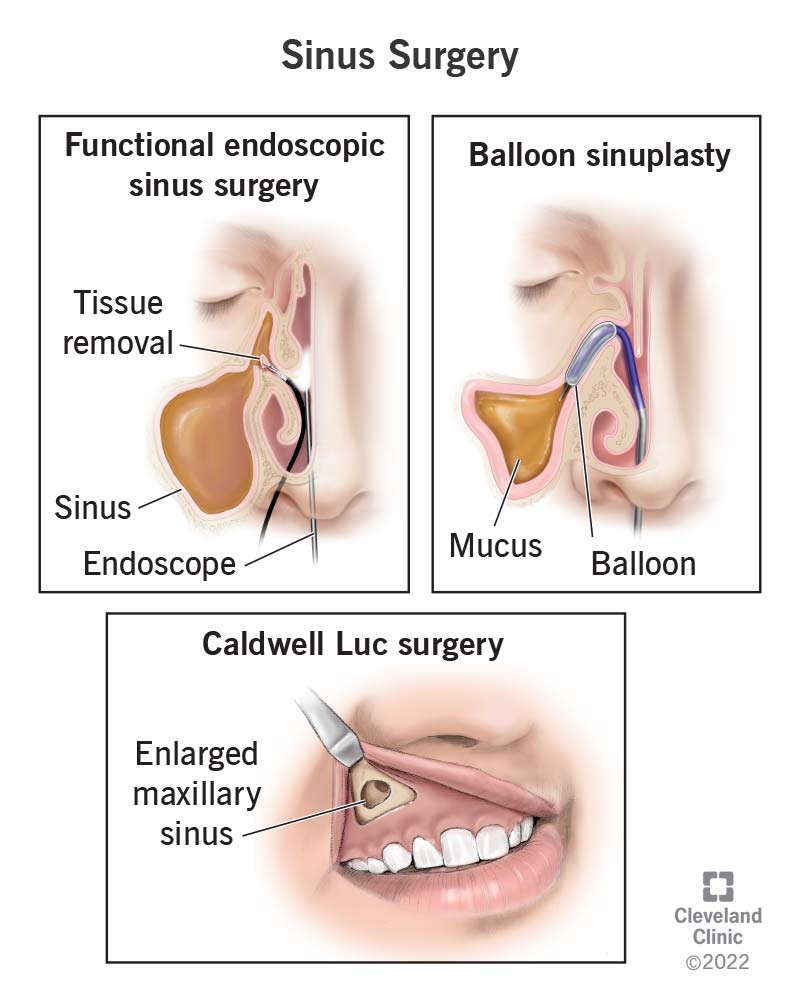Healthcare providers use this surgery to treat chronic sinusitis, remove nasal polyps and treat other conditions that affect your sinuses. Most people have sinus surgery because they have severe sinus problems that medication hasn’t helped. There are several types of sinus surgeries designed to be less invasive with shorter recovery times.
Advertisement
Cleveland Clinic is a non-profit academic medical center. Advertising on our site helps support our mission. We do not endorse non-Cleveland Clinic products or services. Policy

Image content: This image is available to view online.
View image online (https://my.clevelandclinic.org/-/scassets/Images/org/health/articles/15854-sinus-surgery)
Healthcare providers use this surgery to treat chronic sinusitis, remove polyps from your sinuses and treat other conditions. Most people have sinus surgery because they have severe sinus problems that medication hasn’t helped. Sinus surgery may involve removing infected sinus tissue, bone or polyps. There are several types of sinus surgeries designed to be less invasive so you can recover quickly.
Advertisement
Cleveland Clinic is a non-profit academic medical center. Advertising on our site helps support our mission. We do not endorse non-Cleveland Clinic products or services. Policy
There are several types of sinus surgeries:
In sinus surgery, a healthcare provider opens blocked sinus passages. Turbinate reduction is surgery to reduce the size of your turbinates. These are small bony structures inside of your nose.
Advertisement
In general, sinus surgeries aren’t serious surgeries with significant complications.
Healthcare providers use general or local anesthesia when they do sinus surgery. General anesthesia means you’re unconscious and don’t feel any pain. People who have local anesthesia may feel pressure during surgery but typically don’t feel any pain. They may have mild to moderate pain for about a week after surgery.
Your healthcare provider will do a pre-operation screening to be sure you’re able to have the surgery. They may prescribe medications that prevent infection or swelling. Every person’s situation is different, but most healthcare providers recommend the following:
Healthcare providers do functional endoscopic sinus surgery and balloon sinuplasty by inserting surgical tools into your nose. Caldwell Luc surgery involves going through your mouth to reach a sinus cavity and open a passage between that sinus and your nose.
FESS is the standard procedure to treat serious sinus conditions. Here’s an overview of the process:
This is an alternative to FESS. Here’s information about this process:
Advertisement
Healthcare providers typically do this surgery when other procedures haven’t solved your sinus issues. In this surgery, providers open your maxillary sinus, which is located behind your cheek, and create a new path from your sinus to your nose. They typically remove any damaged tissue or bone as part of the surgery. Here’s more information about this surgery:
If you received general anesthesia, you’ll rest in a recovery room while your anesthesia wears off. If you had local anesthesia, you’ll be able to go home right away. Before you leave, your provider will give you information about taking care of yourself as you recover. Your provider may prescribe pain medication to help with the mild or moderate pain you may have for a week or so after your surgery. They may also prescribe antibiotics to help prevent infection.
Advertisement
Any surgery has potential complications, but sinus surgery complications are rare. Ask your healthcare provider to explain what kinds of complications you may have and what they’ll do to help you if you do have complications from sinus surgery. Complications may include:
Persistent sinus pain and stuffiness aren’t life-threatening medical conditions but they can affect your quality of life. Minimally invasive sinus surgery such as FESS and balloon sinuplasty often cures sinus issues. Talk to a healthcare provider if you’re weighing the risk and benefits of sinus surgery. They’ll review your medical history, your current sinus situation and your medical history before making a recommendation.
Advertisement
Most people recover from sinus surgery within a few days. Here are some steps to take to help your recovery:
Sometimes, people’s sinus problems go away right after surgery. Other people may need a few weeks or months before their symptoms go away.
You should contact your provider if you have the following problems:
If you’ve struggled with persistent sinus pain and congestion, sinus surgery may be a safe and simple solution to your sinus issues. The most common sinus surgeries are minimally invasive and often provide immediate relief from sinus pressure and pain while curing sinus infections.

Sign up for our Health Essentials emails for expert guidance on nutrition, fitness, sleep, skin care and more.
Learn more about the Health Library and our editorial process.
Cleveland Clinic’s health articles are based on evidence-backed information and review by medical professionals to ensure accuracy, reliability and up-to-date clinical standards.
Cleveland Clinic’s health articles are based on evidence-backed information and review by medical professionals to ensure accuracy, reliability and up-to-date clinical standards.
Constant stuffiness, sinus pressure and pain can wear you out. But you don’t have to live with it. Cleveland Clinic sinus surgery experts can help you get relief.
